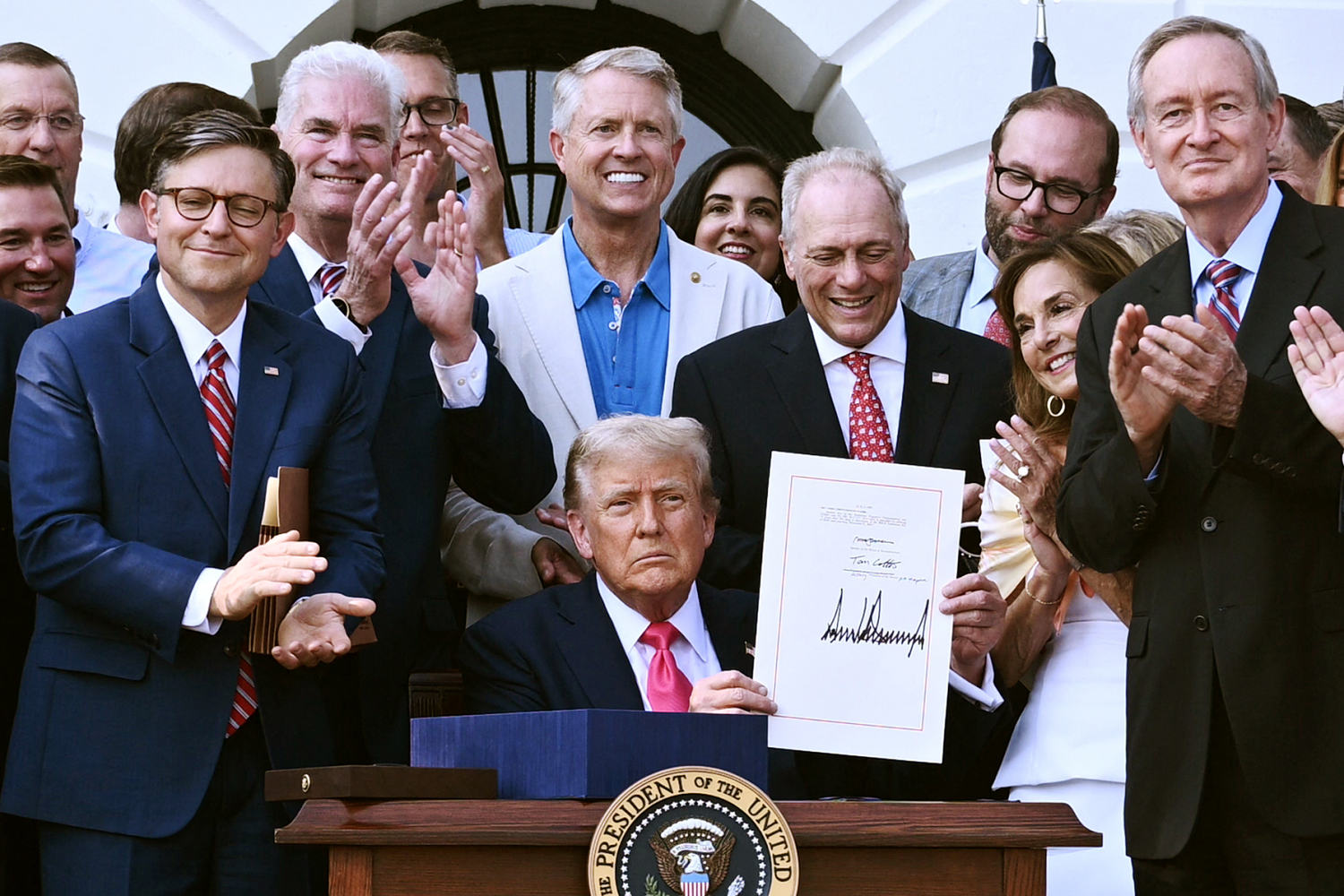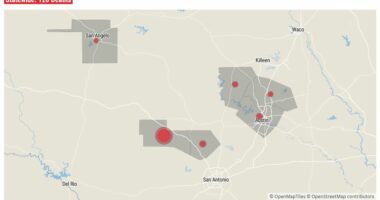Share this @internewscast.com

State legislators are rushing to address the anticipated financial impact of President Donald Trump’s “One Big Beautiful Bill.” In several blue states, there are calls for special legislative sessions, considered crucial to bolster funding for health care and food support programs affected by the new legislation.
Democratic governors in a minimum of five states are contemplating these special sessions, and Democratic lawmakers in additional states are urging their governors to convene these sessions to tackle the projected funding shortages.
Trump’s law enacts significant reductions to Medicaid and food aid benefits, mainly through the introduction of new work requirements. It also imposes limits on state-imposed fees on health care providers, which are typically used to finance Medicaid, a program crucial for 72 million people. Furthermore, the federal government has withdrawn its responsibility for reimbursing states.
The changes will have an outsized effect on people in rural areas, who are likelier to receive their health insurance through Medicaid, and the cuts especially affect the 41 states that voted to expand Medicaid under the Affordable Care Act. The law also means millions of low-income people will lose eligibility for the Supplemental Nutrition Assistance Program, also known as food stamps, and it shifts administrative costs to states.
The combination has state lawmakers saying they face new burdens on their own budgets, and groups of them are clamoring for their legislatures to rapidly identify solutions that can help fill in the shortfalls or avoid major state budget deficits.
In Colorado, Democratic Gov. Jared Polis’ Office of State Planning and Budgeting has projected that the state would receive about $500 billion less in revenue yearly — and could see about the same amount in additional costs — because of the new law’s impact on Medicaid and food assistance.
Lawmakers and health care advocates have predicted the changes could prompt hundreds of thousands of people in Colorado to lose their health care coverage, mostly because it implemented one of the most robust Medicaid expansions in the United States under the Affordable Care Act.
Democratic state Rep. Iman Jodeh said a special session is “absolutely necessary” to deal with the state’s new financial landscape, predicting that it was “imminent” that Polis convenes one.
“We have to do it,” said Jodeh, a member of the House Health and Human Services Committee. “Our budget just cannot absorb the backfill, the shortfall, the cuts.”
Polis spokesperson Shelby Wieman said in email that Polis “has previously indicated we may need to reconvene the General Assembly to deal with the terrible impacts from the bill — and we are still reviewing the impacts of this new law to evaluate next steps, including a potential special session.”
Jodeh said that because of Colorado’s unique Taxpayer Bill of Rights — a 1992 measure that effectively limits how much the state can raise taxes — it will be exceedingly difficult for Democrats, despite their control of the governorship and both legislative chambers, to avoid mostly cutting and freezing social programs to address the expected shortfalls.
“We’re all incredibly scared about how we can possibly navigate this,” she said. “What are those programs that we’re going to have to freeze or defund or do away with all together? Those will be the questions that we’re going to have to answer during the special session.”
Democratic lawmakers in Minnesota — another state that expanded Medicaid early under the Affordable Care Act — said they’re concerned about the same issues. They are also just weeks removed from a special legislative session that featured bruising budget negotiations that included passage of a bill to end state-funded health care for undocumented adults.
Erin Murphy, the Democratic majority leader of the state Senate, said she was “eager” for Democratic Gov. Tim Walz to call another special session “to address the harm that is coming to Minnesota as a result of Trump’s bill.”
“What the Congress has passed is going to blow a hole in our budget — one that we worked very hard to balance,” Murphy said. “For us to prepare and protect Minnesotans, we need to have a special session … to figure out how we’re going to pay for a loss of coverage for people here.”
Walz spokesperson Claire Lancaster said that the governor’s office was “still combing through to determine the extent of the impacts” of the new federal law and that it was “too soon to say” whether Walz would call another special session. The Minnesota House is evenly divided, while Democrats control the Senate.
Walz and Minnesota Democrats have said up to 250,000 people could lose their health coverage because of the law and that the state may lose up to $500 million in federal funding yearly.
In Connecticut, state Sen. Matt Lesser, the Democratic deputy majority leader and chair of the Senate Human Services Committee, said state Democrats “were moving in the direction” of a September special session intended specifically to address the budget gaps stemming from the new federal law.
“Nobody can absorb the kinds of cuts that we’re anticipating for the next few years,” Lesser said.
Unlike in Minnesota and Colorado, Lesser predicted that a Connecticut special session might seek to raise taxes or find other sources of revenue to address the expected shortfalls to social safety net programs.
The Kaiser Family Foundation has estimated that the state could lose $13 billion in Medicaid funding over 10 years as a result of Trump’s law.
Lesser said that the impacts of the changes to SNAP aren’t fully understood yet — but that early estimates suggested Connecticut would have to pick up 75% of the program’s cost, or about $40 million a year.
“A lot of what the ‘OBBB’ does is just a cost shift from the federal government to the states,” he said.
Rob Blanchard, a spokesperson for Gov. Ned Lamont, a Democrat, responded to questions about whether he’d call a special session by saying that the “administration is dedicated to doing what we can do mitigate some of the impact from this bill” and that it is “analyzing” it.
“We will be meeting agency leaders and, later, our colleagues in the General Assembly to discuss next steps,” Blanchard said. Democrats control the governorship and both legislative chambers in Connecticut.
The Democratic governors of New Mexico and Washington — where Democrats also enjoy full control of state government — have also indicated they’re considering calling special legislative sessions to tackle expected funding shortfalls.
Gov. Michelle Lujan Grisham “is strongly considering a special session to help mitigate harm to New Mexicans from this disastrous Republican budget bill,” spokesperson Michael Coleman said in an email.
New Mexico lawmakers and health care advocates have predicted that up to 89,000 residents might be kicked off Medicaid and that up to 58,000 could lose their SNAP benefits because of the law.
Washington Gov. Bob Ferguson said in an email that “there is no question the impacts of President Trump’s Big Betrayal Bill are dire for Washingtonians in terms of cuts to Medicaid and other important benefits.”
Ferguson added that, “at this time, we do not believe a special session is needed,” but he said he “will definitely be having conversations with legislative leaders and my team about whether a special session is needed.”
Ferguson’s office has estimated that the law will cause Washington to lose $3 billion a year in federal Medicaid funding and that it would be on the hook for at least an additional $188 million related to the SNAP changes.
Democrats in states with Republican governors are also roaring for their leaders to address the expected funding gaps — though their expectations for special sessions are close to zero.
Georgia Democrats have advocated publicly for Republican Gov. Brian Kemp to call a special session — though a bipartisan group of legislators has said they’ll wait until their regular session convenes in January to address the budget. Georgia stands to lose about $10 billion in Medicaid funding over the next 10 years, according to the Kaiser Family Foundation.
Meanwhile, Nebraska Democrats said they’re particularly concerned about the law’s impact on rural hospitals. One — the Curtis Medical Center — has already announced plans to close, citing the cuts to Medicaid implemented by Trump’s law. And legislators say six more rural hospitals could close within the next two years as the law is implemented.
“I just want to underscore how devastating this is — particularly for rural parts of our state,” said state Sen. John Fredrickson, a Democrat.
Still, Fredrickson said he did “not anticipate” a special session in Nebraska, where Republicans control the governorship and its single legislative chamber. A spokesperson for Republican Gov. Jim Pillen didn’t respond to questions about a possible special session.
“As we go into session next year, we are going to have to make significant adjustments to our budget based on this bill’s passage,” Fredrickson said. “This bill is going to have a significant impact on the state’s ability to provide and fund basic social needs, and those services are going to be at risk as a result.”

















